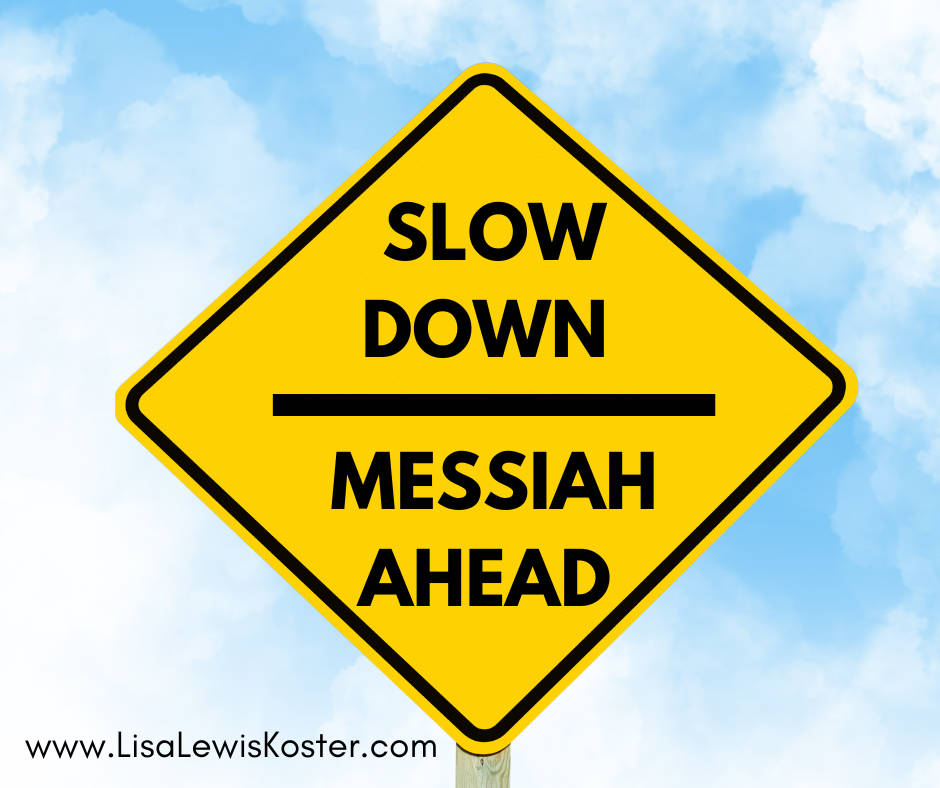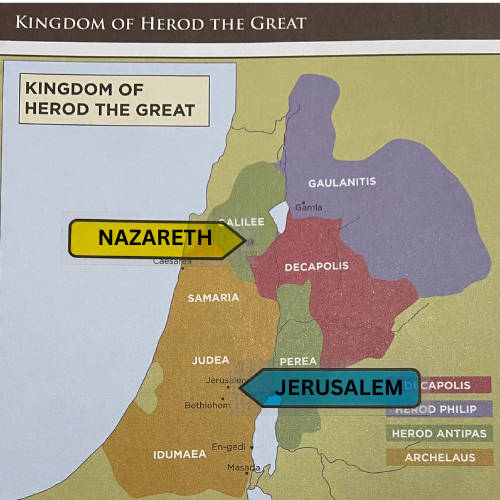
Can you have too many books?
My answer to that question is “No, but you can have too little space!” I am blessed with enough bookcases to hold about 300 books, yet every January I work to eliminate the books piled up on the floor. For the most part they are new acquisitions, so they get to stay. That means I need to examine the shelves to determine which books have to leave.
Thankfully I don’t have to part with many books this year, because the first one I grabbed is definitely a keeper! It’s entitled “The Everlasting Tradition,” written by Galen Peterson in 1995. Its subtitle is “Jewish Customs, Holidays, and Historical Events That Reveal Biblical Truth.” I learned things that are truly amazing, and I’m going to share one of them with you!

Have you ever wondered why the religious leaders in Jesus’ day brought Him to Pilate to be killed? Why didn’t they execute Him themselves? After all, there are many instances of stoning in the Bible. They didn’t, because they couldn’t. Early in Jesus’ life, while He and His family were living in Egypt, something changed.
In Matthew chapter two, an angel of the Lord announced the death of Herod [the Great] and informed Joseph that it was safe for his family to return to Israel. Herod’s successor was someone I’d never heard of, but perhaps this is because he is mentioned in the Bible only once – his son Archelaus. “But when he [Joseph] heard that Archelaus was reigning over Judea in place of his father Herod, he was afraid to go there, and being warned in a dream he withdrew to the district of Galilee” (Mt 2:22, ESV). Archelaus was in southern Israel, so Joseph took his family north to Nazareth.
The Jewish people did not like Archelaus any more than they cared for his father. In fact, they were so displeased that a group of them went to Rome to speak to Caesar Augustus. They warned Caesar that there would be a revolt if Archelaus continued to rule over them. Surprisingly, Augustus listened to them and removed Archelaus from power. The Jewish historian Josephus writes: “Archelaus’ part of Judea was reduced into a province, and Coponius…was sent as a procurator, having the power of death put into his hands by Caesar.” 1
I believe this falls into the category of, “Be careful what you wish for, because you just might get it!” The Jewish leaders got rid of Archelaus, which they wanted, but they also lost something very important to them. Reread the quote from Josephus in the paragraph above. Do you see it? The Jews lost the power to impose the death penalty. The power of death was now in the hands of Rome, via their procurator. This position, originally held by Coponius, will later belong to Pontius Pilate.
The Sanhedrin, the ruling body of the Israelites, was now powerless. They felt they could no longer enforce the Law of Moses without the power of the death penalty. The Jewish people referred to this as losing their scepter. Now, there was much debate about this turn of events. Some were insisting they stand against this Roman ruling. Others pointed out that the Jewish people had many enemies, so perhaps it was a good thing that they were no longer allowed to execute their own people.
But there was a bigger problem.
At the end of the book of Genesis, Jacob spoke prophesy to each of his sons. Speaking of his son Judah, Jacob said, “The scepter will not depart from Judah, nor the ruler’s staff from between his feet, until he to whom it belongs shall come and the obedience of the nations shall be his” (Genesis 49:10, NIV).
At first glance, it appears Israel’s loss of power contradicts Jacob’s prophecy. Could this prophecy be wrong? (The correct answer is “No!”) If we think Scripture is wrong, we need to think again! The first thing we need to do when reading the Bible is to look at what it says. Not what we think it says or should say, but what it actually says, and what that means in its original context.
In the middle of Jacob’s prophesy to Judah we read about the ruler’s staff from between his feet. Whenever the staff between a man’s feet or legs is mentioned, they are talking about descendants. So Jacob’s promise to Judah is that he will have many descendants, and the ultimate ruler, the Messiah, will be one of them.
Now let’s look at the prophesy without that middle phrase: The scepter will not depart from Judah … until he to whom it belongs [the Messiah] shall come… The prophesy never said that the Israelites will always be able to rule over themselves according to the laws of Moses. It said they will rule over themselves until the Messiah comes! Ultimately, it is the Messiah who rules and reigns.
The members of the Sanhedrin understood that if they lost their scepter, the Messiah must have come. But where was He? One member asked the others which one of them was the Messiah. If the Messiah came, surely he would be among this distinguished group of men! When no one answered, he concluded that Scripture must be wrong, or perhaps it was a scribal error. The scribes did not take kindly to this, since they were meticulous in copying God’s word. They suggested that perhaps the Messiah had come, but they did not recognize Him. The esteemed members of the Sanhedrin dismissed this idea. They were certain that they, the most educated in Israel, would surely recognize the Messiah.
They. Were. Wrong.
Little did they know, the Messiah arrived about eleven years earlier and lived in Nazareth.
Rather than believing the Bible prophecy had been fulfilled, they came to the following conclusion: “All of the predestined dates for redemption have passed and the matter now depends only on repentance and good deeds.” 2
Rather than searching the Scriptures and searching for the Messiah, these highly educated men resorted to earning their way into heaven. They did what was right in their own eyes.
In contrast, Jesus’ earthly father Joseph, a humble man who worked with his hands, recognized God’s voice and followed His direction.3
As the Bible says, Trust in the Lord with all your heart, and do not lean on your own understanding (Proverbs 3:5, ESV).
Which of these men would you call wise?
1 Josephus, Wars of the Jews II 8:1.
2 Babylonian Talmud, Sanhedrin 97b.
3 Information in this post is based on Galen Peterson’s book, “The Everlasting Tradition.”

